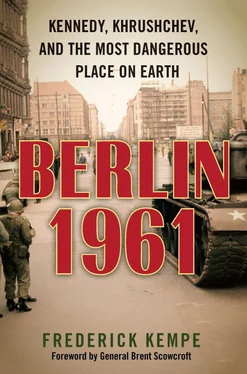Frederick Kempe
BERLIN 1961
KENNEDY, KHRUSHCHEV, AND THE MOST DANGEROUS PLACE ON EARTH
FOREWORD
by General Brent Scowcroft
Historians have scrutinized the Cuban Missile Crisis of 1962 far more deeply than they have the Berlin Crisis that preceded it by a year. For all the attention given Cuba, however, what happened in Berlin was even more decisive in shaping the era between the end of World War II in 1945 and German unification and Soviet dissolution in 1990 and 1991. It was the Berlin Wall’s rise in August 1961 that anchored the Cold War in the mutual hostility that would last for another three decades, locking us into habits, procedures, and suspicions that would fall only with that same wall on November 9, 1989.
Furthermore, there was a special intensity about that first crisis. In the words of William Kaufman, a Kennedy administration strategist who worked both Berlin and Cuba from the Pentagon, “Berlin was the worst moment of the Cold War. Although I was deeply involved in the Cuban Missile Crisis, I personally thought that the Berlin confrontation, especially after the wall went up, where you had Soviet and U.S. tanks literally facing one another with guns pointed, was a more dangerous situation. We had very clear indications mid-week of the Cuban Missile Crisis that the Russians were not really going to push us to the edge….
“You didn’t get that sense in Berlin.”
Fred Kempe’s contribution to our crucial understanding of that time is that he combines the “You are there” storytelling skills of a journalist, the analytical skills of the political scientist, and the historian’s use of declassified U.S., Soviet, and German documents to provide unique insight into the forces and individuals behind the construction of the Berlin Wall—the iconic barrier that came to symbolize the Cold War’s divisions.
History, sadly, does not reveal its alternatives. However, Kempe’s important book prompts the reader to reflect on crucial questions regarding the Berlin Crisis that raise larger issues about American presidential leadership.
Could we have ended the Cold War earlier if President John F. Kennedy had managed his relationship with Nikita Khrushchev differently? In the early hours of Kennedy’s administration, Khrushchev released captured U.S. airmen, published Kennedy’s unedited inaugural address in Soviet newspapers, and reduced state jamming of Radio Free Europe and Radio Liberty broadcasts. Could Kennedy have more fully tested the possibilities behind Khrushchev’s conciliatory gestures? If Kennedy had handled Khrushchev differently at the Vienna Summit in June 1961, would the Soviet leader have balked at the notion of closing Berlin’s border two months later?
Or, on the other hand, as some have suggested: Is it possible that we should regard Kennedy’s acquiescence to the communist construction of the Wall in August 1961 as the best of bad alternatives in a dangerous world? Kennedy famously said he preferred a wall to a war—and there was reason for him to believe that was the choice that confronted him.
These are not small matters.
Another question raised by Kempe’s compelling narrative is whether we, in the richness of time, will look at the Cold War in a more nuanced manner than we do now. The Cold War was not simply a standoff against a Soviet Union bent on world domination; it was also driven by a series of self-reinforcing misinterpretations of what the other side was up to. Berlin 1961 ’s account of the miscommunication and misunderstandings between the United States and the Soviet Union at that crucial time makes one wonder whether we might have produced better outcomes if we had more clearly understood the domestic, economic, political, and other forces compelling our rival’s behavior.
These are speculative questions no one can answer with any certainty. Yet raising them in the context of Berlin 1961 is as relevant to navigating the future as it is to understanding the past. In the pages that follow are clues and cautions that are particularly timely during the first term of another young and relatively inexperienced commander in chief, President Barack Obama, who, like Kennedy, came to the White House with a foreign policy agenda aimed at engaging our adversaries more skillfully and understanding more reliably what lurks beneath seemingly intractable conflicts in order that we can better solve them.
I know something of such issues and challenges myself from our days dealing with Soviet leader Mikhail Gorbachev when I served as national security advisor in President George H. W. Bush’s White House.
The two U.S. presidents who dealt with Gorbachev, Bush and Ronald Reagan, were very different men. However, both understood that nothing was more important in trying to end the Cold War than the ways in which they engaged their Soviet counterpart.
Despite labeling the Soviets “the evil empire,” President Reagan engaged in five summit meetings with Gorbachev and worked on countless concrete agreements that helped build confidence between the two countries. As the Berlin Wall fell in 1989 and we worked to bring about German unification, President Bush resisted all temptations to gloat or breast-beat. He consistently sent the message that both sides were winning if the Cold War was ending. Through exercising such moderation in his public statements, he also avoided giving Gorbachev’s enemies in the Soviet Politburo any excuse to reverse his policies or remove him from office.
One can do no more than speculate on how either a tougher or a more conciliatory Kennedy might have altered history in the Berlin of 1961. What is indisputable is that the events of that year put the Cold War back into a deep freeze at a time when Khrushchev’s break with Stalinism might have presented us with the first possibilities of a thaw.
Berlin 1961 walks us through those events in striking new ways, exploring the fundamental natures of the two primary countries, the U.S. and the Soviet Union; the domestic political environments of each; and the crucial roles played by the personal characters of their leaders; and then weaving it all into the equally important stories of how those factors played out in the countries of East Germany and West Germany themselves.
It is an engaging, richly researched, thought-provoking book that captures the drama of the time in its colorful Berlin setting, and challenges the conventional wisdom regarding one of the Cold War’s most decisive years.
INTRODUCTION:
THE WORLD’S MOST DANGEROUS PLACE
Who possesses Berlin possesses Germany, and whoever controls Germany controls Europe.
Vladimir Lenin, quoting Karl Marx
Berlin is the most dangerous place in the world. The USSR wants to perform an operation on this soft spot to eliminate this thorn, this ulcer.
Premier Nikita Khrushchev to President John F. Kennedy at their Vienna Summit, June 1961
CHECKPOINT CHARLIE, BERLIN
9:00 P.M., FRIDAY, OCTOBER 27, 1961
There had not been a more perilous moment in the Cold War.
Undaunted by the damp, dangerous night, Berliners gathered on the narrow side streets opening up onto Checkpoint Charlie. The next morning’s newspapers would estimate their numbers at about five hundred, a considerable crowd considering that they might have been witnesses to the first shots of a thermonuclear war. After six days of escalating tensions, American M48 Patton and Soviet T-54 tanks were facing off just a stone’s throw from one another—ten on each side, with roughly two dozen more in nearby reserve.
Читать дальше












